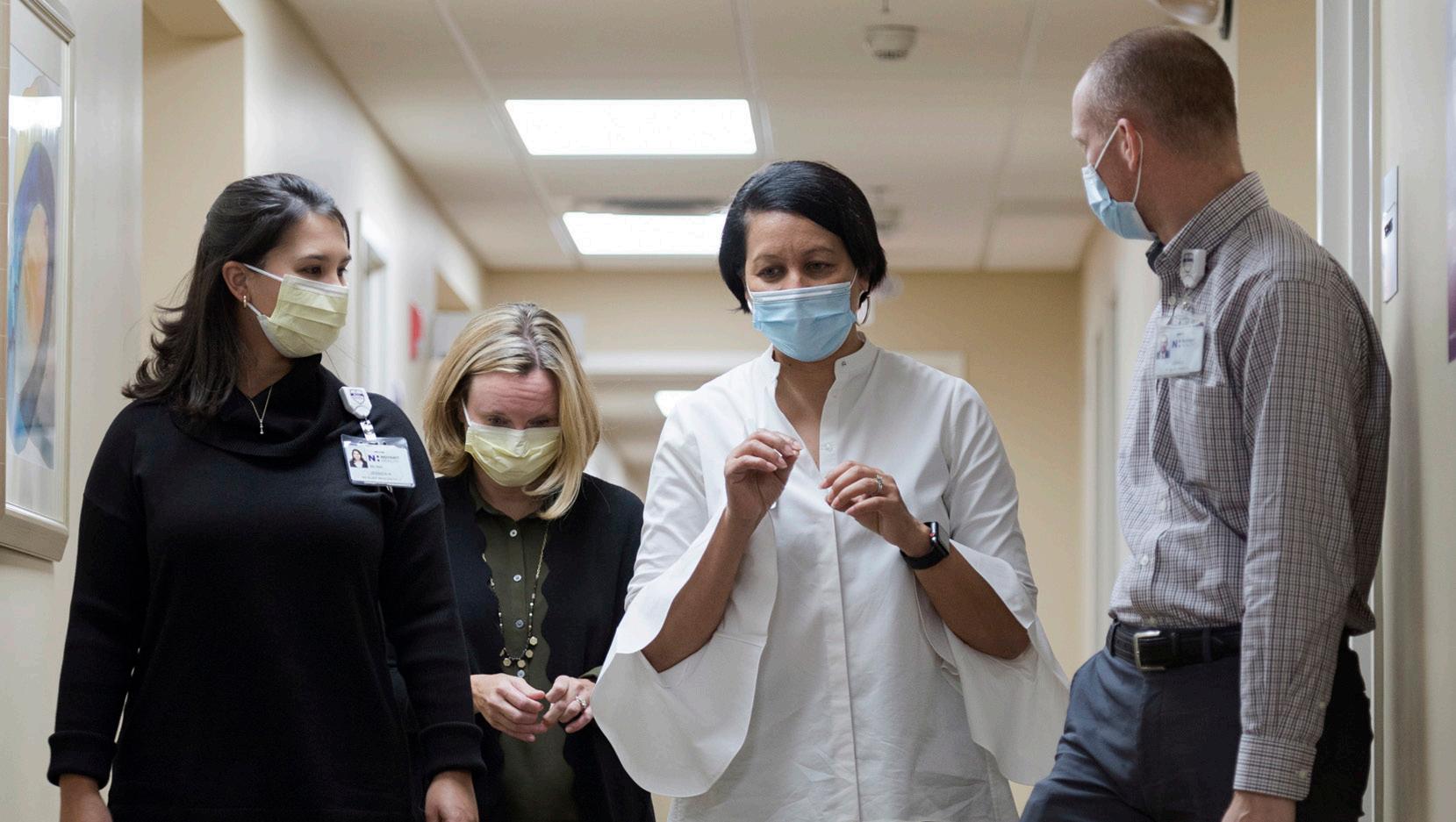
4 minute read
Why this doctor is taking on Black maternal health
By Gina DiPietro
When her father was diagnosed with cancer, Pam Oliver, MD, then just a girl from rural North Carolina, knew she wanted to pursue medicine. Today her calling to help others is as deeply woven into her DNA as the color of her black hair.
Known to some in her leadership roles – Novant Health executive vice president and president of Novant Health Physician Network – and to others as their ob-gyn, Oliver has dedicated her career to taking care of people.
So, it should come as no surprise that a friendship with U.S. Rep. Alma Adams catapulted Oliver into a new endeavor: Advocate for Black maternal health.

“I think to whom much is given, much is expected. And my role allows me to have a platform and access that I shouldn’t take for granted,” Oliver said.
Their goal is to improve health outcomes for Black women in the United States who, data shows, are three to four times more likely to die than white women during pregnancy, at delivery or soon after.
“It is personal for me,” Oliver said. “I think about the generations of women before me and the generations that are coming after me, and I don’t want this to be the legacy that we leave for them,” Oliver said.
Deciphering the Black maternal health crisis
What’s behind the Black maternal health crisis in the United States? There’s no one answer, Oliver said, but “it is not about a lack of educating yourself or going to the doctor.” gave birth in hospitals are more likely to die during pregnancy or childbirth than white women who never graduated from high school.
Consider a five-year study that found Black, college-educated mothers who Dr.
In some cases, access is an issue. Women in rural communities may have less access to an ob-gyn or a high-risk pregnancy specialist. And Black women are more likely to have complicated pregnancies, Oliver said.
But even when you take those factors into account, there’s no denying the cumulative effect of “systemic bias and racism,” Oliver said.
The weathering effect of racism
Consider the weathering effect of racism in America. The weathering hypothesis, introduced in the early 1990s, says the accumulation of racial stress in Black women’s lives may actually deteriorate their health.
There is evidence of weathering, which can begin at an early age and increase over time, regardless of a person’s socioeconomic status. Among the researchers’ findings:
The effect of “social or economic adversity and political marginalization” leads to an earlier deterioration of health among Black women.
On a biological level, “persistent, high-effort coping with acute and chronic stressors can have a profound effect on health.”
Emotionally, the stress of living in a “race-conscious society that stigmatizes and disadvantages Blacks may cause a disproportionate physical deterioration.”
Weathering effect research also found that Black women may have the same morbidity or mortality of a white person who is significantly older than them.
“It’s complicated,” Oliver said. “But it also says that we cannot waste time. We have to act now if we’re going to have a chance at changing the direction for one to two generations out. And we cannot do it completely just in health care. We must have complex, broad solutions …”
A shared goal to advance policy
Oliver forged a relationship years ago with Rep. Adams, who founded the Black Maternal Health Caucus and represents North Carolina’s 12th congressional district.
Adams even invited Oliver to be her guest at the State of the Union address – a moment that was documented on social media in early 2020. They’re pictured together, standing proudly, at the Capitol in Washington with a caption that read, “Maternal health is an important issue to both of us.”
Oliver listened to stories from other attendees, saying the experience “opened her eyes.” But it also gave her the opportunity to shine a light on key issues, like Black maternal health.
Since then, her advocacy has become more vocal. Oliver has spoken directly with members of Congress and participates in panels of physicians and advocates from around the country.

“Lawmakers get so many viewpoints on any given issue. They hear strongly from the insurance and pharmaceutical industries. As physicians and health systems who want to help foster healthy communities, and even as a patient myself, I’m honored to be that voice for women,” she said.
A ‘truly remarkable’ bill
Oliver has also been engaged in raising awareness for a variety of bills in Congress that address the Black maternal health crisis in the United States.
Some would require better data collection, while others aim to increase access to maternal care or birth advocates like doulas. Data shows that having a doula can reduce maternal mortality.
“A doula is someone to help you have your voice and make sure your voice is heard. And that’s really important, because the one thing we hear consistently from Black women is they don’t feel seen and heard. They feel their issues are pushed to the side,” Oliver said.
“So, if we’re going to solve this crisis for future generations of women, it requires that we listen to Black women and take their issues seriously. It really requires a respect for every woman,” she added.
Approachable advice on tackling big issues
Oliver is inspired by the progress she’s witnessed in recent years. COVID shined a light on disparities in health, she said, and major corporations have donated billions of dollars to advance racial equity and economic opportunity by investing in Black women.
“Black maternal health, like many health inequities and disparities, can be overwhelming when you think about it. But we cannot let that deter us from taking any small steps to get there,” Oliver said.

















